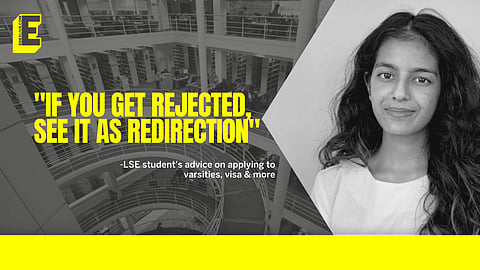

Prateeksha Karat is currently pursuing her MSc in Developmental Studies from the London School of Economics (LSE) in the United Kingdom. How did she navigate the process of college applications, visa, accommodation and everything else in between? Let's find out straight from her
What should one do after submitting their college application? What should ideally be next on the agenda? What did you do?
First, you should pat yourself on the back for getting through an extremely exhausting process. Take the time between your applications and the university start date to really relax. You are going to be extremely busy once the offers start rolling in. However, you need to ensure to make the process less stressful.
Here is what I did:
- Finances:
Scholarship applications: If your university has a funding system, it might require an essay. Take time out to tailor and edit your scholarship essays, like your Statement of Purpose (SoP). Find out the application deadlines.
Loans: If you are going to take an education loan, make a list of banks that you should talk to. Get property papers and all the documents needed in order.
- Post-masters's plan:
Chances are that you are not 100% sure which university you will eventually select. So, you can reach out to people on LinkedIn, if you haven’t already, to talk to them about their experience at the universities you have applied to.
Think about your objectives. Do you want a job straight after your master's? Are you going to stay back or come back to India? Do you want to socialise? How important are external factors like the weather, and city to you?
Focus on what your university offers, their career hub, the teaching styles, what the professors are teaching, and if you are interested in their work. Think about the industries and jobs that graduates end up in.
- Accommodation:
If you are moving to a big city, accommodation will be extremely hard to find.
Narrow down options, and apply to a few places that require lengthy applications. The earlier you start, the more likely you are to find a good place for a cheap rate.
- Visa:
You will need to do several medical tests and have all your documents and finances in order for your visa application.
Visa offices are extremely overloaded with applications during this time of the year. Make sure your application is faultless to ensure that everything goes smoothly.
Did you have an interview before you received your letter of acceptance? What was asked in the interview? How can one ace it?
London School of Economics does not do interviews, so I did not have one.
What should be next for applicants after their admission gets confirmed or rejected?
If you get rejected, see it as redirection. There are so many options for you, a different university, a different course, a break year where you can get industry experience. You can always reapply, doing a master's with some industry experience will set you up really well.
If accepted, you already did the pre-research while waiting for your offer. Accept your offer, get your finances in order, and apply for your visa and your accommodation. You might have a reading list, make a clear plan to tackle your reading list when you are busy with other aspects of moving abroad.
I recommend that you make a master to-do list and break down every aspect to its smallest details. If you stay organised, the process will not feel as overwhelming and you are less likely to miss things. Use technology to your advantage. Have an Excel sheet and to-do list for every aspect of your application process
